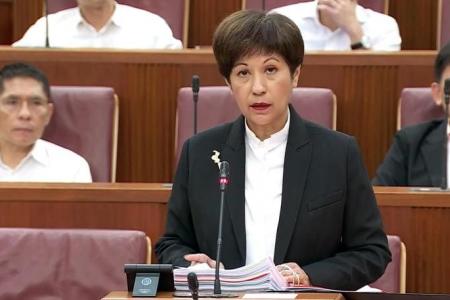Issuing stern warnings to former Keppel O&M staff a balanced solution
Issuing stern warnings to the six former management staff from Keppel Offshore & Marine Limited (KOM) was an “in-between” solution but the right thing to do, said Minister in the Prime Minister’s Office Indranee Rajah.
She was responding to a follow-up question from Workers’ Party MP Leon Perera (Aljunied GRC), who asked on what basis stern warnings were issued by the Corrupt Practices Investigation Bureau (CPIB), given the insufficient evidence.
Ms Indranee said that a stern warning is given when one cannot give a complete clean bill of health, but at the same time does not have enough to clear the evidentiary hurdle.
“So you see, what are the choices: Do nothing at all, or bring charges when you know you don’t have sufficient evidence? Or is there something in-between? The stern warning device is the something in-between.”
She added that closing the investigation without doing anything would not have been the correct thing to do. “The stern warning device... it’s an expression of AGC’s position that we don’t think that you’re completely off the hook.”
Dr Tan Wu Meng (Jurong GRC) asked if the AGC did not pursue the case because it was an “uphill task in and of itself or outright impossible, given the available facts”.
Ms Indranee responded that the correct test is that there must be a reasonable prospect of obtaining a conviction, because there must be a certain threshold.
“Otherwise, if you just go around filing charges with insufficient basis, that would not make for a strong justice system. And that is the threshold that AGC feels that it is not able to get over in this particular case.”
Leader of the Opposition Pritam Singh questioned if KOM board at that time when the offences were committed had “constructive knowledge” - something that they could reasonably be expected to know - of corrupt payments being made to secure contracts in Brazil.
“If the question is whether the investigation included determining if there was constructive knowledge, the answer is if constructive knowledge is not an offence, then there’s no reason for CPIB to be investigating this,” said Ms Indranee.
She added that the CPIB investigates offences under the Prevention of Corruption Act (PCA), and that is what it had done in this case. “Unfortunately, there’s insufficient evidence for them to mount a prosecution.”
Mr Murali Pillai (Bukit Batok) asked if it was an opportune time to review Section 37 of the PCA - which describes the liability of Singapore citizens for offences committed outside Singapore - to include companies.
Ms Indranee replied that the Government’s general assessment is that the PCA does have sufficient powers, but it is open to suggestions if there is anything that can be usefully reviewed or improved.
She reiterated the Government’s zero-tolerance stance on corruption.
“We make sure that our laws are directed at ensuring that you have good corporate governance,” she said.
“So all the signals that we send as a government is to tell our companies, please do business properly. And of course, it’s incumbent upon those companies, not the Government, to ensure that their staff (and) their practices are clean and above board, and in accordance with proper governance.”
Get The New Paper on your phone with the free TNP app. Download from the Apple App Store or Google Play Store now


